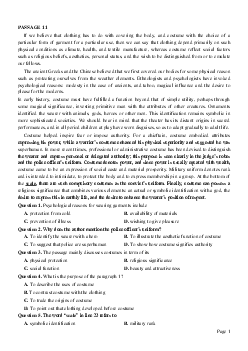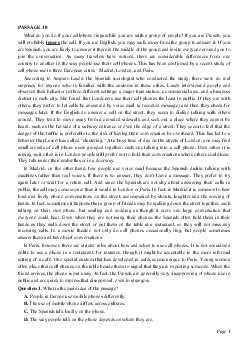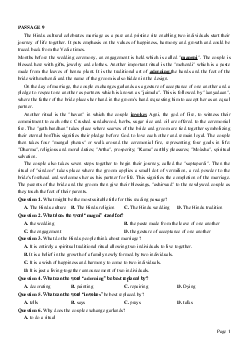

Preview text:
PASSAGE 27
One question that is being debated these days is whether or not genetic engineering is a good thing. Our
science editor has contributed this article to help our readers become more informed on the issue. We hear
this term “genetic engineering” with increasing frequency these days. For those readers who may not be
sure of its meaning, some definitions follow. When we speak of genes, we are referring to chemical
substances in the cells of all-living things that establish an organism’s characteristics. Genetic engineering
is the changing of certain genes, usually to improve an organism in some way. In recent years, for
example, certain genes have been placed in tomato plants to make tomatoes taste better and keep them
fresh in supermarkets for a longer time. Cows have been treated with a growth hormone that makes dairy
cattle give more milk and reduces the amount of fat in the meat of beef cattle. These sound like positive
things, don’t they? After all, many people say, the technology exists to improve our lives.
But there are plenty of people around who oppose genetic engineering. Why? Two specific objections
come to mind. One is that the balance of nature might be upset. Suppose, for example, that scientists are
able to genetically engineer certain plants so that insects will not eat them. This will protect the plants, but
the insects will be deprived of a food supply - and other animals that depend on those insects for food will
lose their food supply, too. The other objection is a moral question. Is it acceptable or right for us to
change the makeup of living things?
Supporters of genetic engineering say the benefits outweigh the dangers. Look at all the improvements
that can be made in plants raised for food, they say. Because of genetic engineering, plants that produce
more fruits and vegetables and resist disease can be grown. In a world where more and more food will be
needed in the future, this is a benefit. The medical advances provided by genetic engineering, say the
supporters, are even more impressive. Consider cancer, for example. If genetic engineering can provide a
way to cure or prevent this disease, shouldn’t it be used? And if genetic engineering can be used to kill
the virus that causes AIDS, shouldn’t it be permitted?
Opponents of genetic engineering say it should be stopped, or at least limited. Proponents of genetic
engineering say it should be promoted and expanded. The debate goes on.
Question 1. What is TRUE about genetic engineering, according to paragraph 1?
A. It increases people’s age.
B. It improves fat in the meat.
C. It changes genes’ parameters.
D. it reduces the number of cells.
Question 2. Genetic engineering is said to be aimed at .
A. changing genes of plants and animals
B. placing new genes into plants
C. establishing an organism’s characteristic
D. improving an organism in some way
Question 3. The word “one” in the paragraph refers to . A. specific objection B. mind C. balance of nature D. example
Question 4. It is stated in paragraph 2 that .
A. scientists control the number of insects
B. ecosystems should be counter balanced
C. insects protect the plants from extinction
D. people should be concerned about wild animals
Question 5. The word “outweigh” in the passage is closest in meaning to . A. have the same value
B. be of greater importance C. weigh heavier than D. be less expensive
Question 6. Which of the following is NOT mentioned by the supporters of genetic engineering? Page 1
A. It has more advantages than weak points.
B. It will help to achieve record harvests.
C. It can be controlled and stopped any moment. D. It will mean breakthrough in medicine.
Question 7. All of the following is mentioned in the passage EXCEPT .
A. genetic engineering will save plants and insects from extinction
B. certain genes can make some vegetables more delicious
C. genetic engineering could help sick people
D. it’s harmful to interfere in animal life
Question 8. Which of the following is the most appropriate title for the passage?
A. Can genetic engineering be harmful to the environment?
B. People can manage genetic engineering
C. Genetic engineering: Superfoods
D. Genetic engineering: Forward or Backward? ĐÁP ÁN 1-C 2-D 3-A 4-B 5-B 6-C 7-A 8-D Page 2




